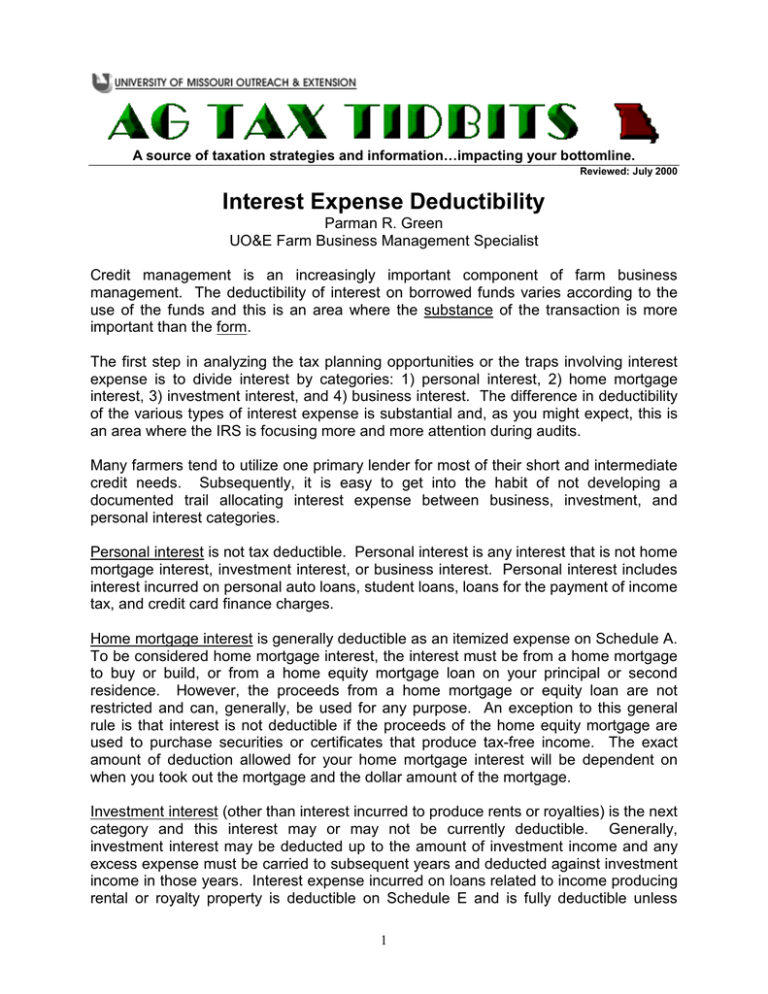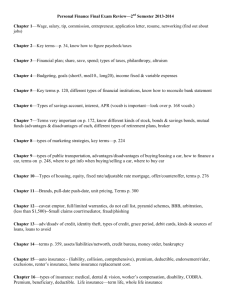Interest Expense Deductibility
advertisement

A source of taxation strategies and information…impacting your bottomline. Reviewed: July 2000 Interest Expense Deductibility Parman R. Green UO&E Farm Business Management Specialist Credit management is an increasingly important component of farm business management. The deductibility of interest on borrowed funds varies according to the use of the funds and this is an area where the substance of the transaction is more important than the form. The first step in analyzing the tax planning opportunities or the traps involving interest expense is to divide interest by categories: 1) personal interest, 2) home mortgage interest, 3) investment interest, and 4) business interest. The difference in deductibility of the various types of interest expense is substantial and, as you might expect, this is an area where the IRS is focusing more and more attention during audits. Many farmers tend to utilize one primary lender for most of their short and intermediate credit needs. Subsequently, it is easy to get into the habit of not developing a documented trail allocating interest expense between business, investment, and personal interest categories. Personal interest is not tax deductible. Personal interest is any interest that is not home mortgage interest, investment interest, or business interest. Personal interest includes interest incurred on personal auto loans, student loans, loans for the payment of income tax, and credit card finance charges. Home mortgage interest is generally deductible as an itemized expense on Schedule A. To be considered home mortgage interest, the interest must be from a home mortgage to buy or build, or from a home equity mortgage loan on your principal or second residence. However, the proceeds from a home mortgage or equity loan are not restricted and can, generally, be used for any purpose. An exception to this general rule is that interest is not deductible if the proceeds of the home equity mortgage are used to purchase securities or certificates that produce tax-free income. The exact amount of deduction allowed for your home mortgage interest will be dependent on when you took out the mortgage and the dollar amount of the mortgage. Investment interest (other than interest incurred to produce rents or royalties) is the next category and this interest may or may not be currently deductible. Generally, investment interest may be deducted up to the amount of investment income and any excess expense must be carried to subsequent years and deducted against investment income in those years. Interest expense incurred on loans related to income producing rental or royalty property is deductible on Schedule E and is fully deductible unless 1 limited by the passive activity rules. In general, interest and other passive activity expenses are currently deductible to the extent they do not exceed the income from the passive activity. However, there is an important exception that allows up to $25,000 of loss to be currently deductible from a rental real estate activity in which the taxpayer actively participates and if the taxpayer has an adjusted gross income less than $100,000. Business interest is fully and currently deductible. However, given the difference in deductibility of interest, it is increasingly important to avoid commingling business borrowed funds with non-business funds. If you are a sole proprietor, the use of two checking accounts is highly recommended – one for business and one for non-business transactions. In addition to understanding the interest expense categories, there is one potential tax trap of which cash-basis taxpayers should be aware. Farmers and other business owners on cash-basis accounting frequently make yearend adjustments to their net income by paying accrued interest. The IRS has ruled, and this ruling has been consistently supported by the courts, that interest is not currently deductible where the taxpayer issued a check in payment of the interest, but at or near the same time borrowed additional funds from the same creditor. One option that has been successful is to borrow funds for the interest payment from a different lender. Additionally, while you are permitted to pay accrued to-date interest, a current deduction is not allowed of the prepayment of any interest. University Outreach and Extension does not discriminate on the basis of race, color, national origin, sex, religion, age, disability or status as a Vietnam-era veteran in employment or programs. 2






